
Ukrainians have a predominantly neutral attitude towards Libya, although the level of negative assessments is higher than for most other North African countries. This is evidenced by the results of a survey conducted by Active Group in partnership with Experts Club.
According to the data, 9.3% of respondents expressed a positive attitude toward Libya (6% — mostly positive, 3.3% — completely positive). A negative attitude was expressed by 14.3% of respondents (11.7% — mostly negative, 2.7% — completely negative). The majority of Ukrainians — 69.7% — took a neutral position, while another 6.7% said they did not have enough information.
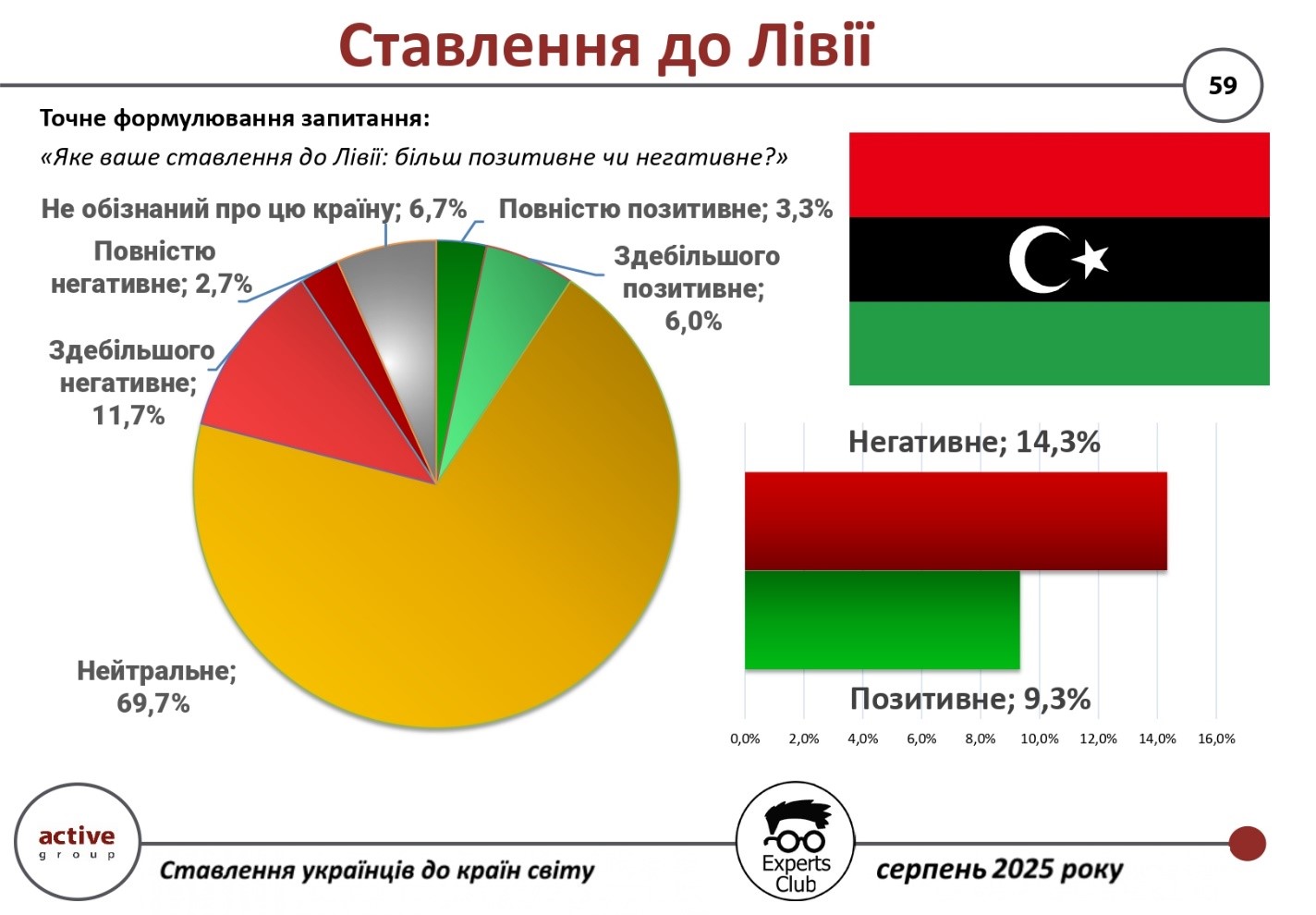
In 2024, trade turnover between Ukraine and Libya amounted to $149.7 million, of which exports accounted for $141.7 million and imports for $8.1 million. The positive balance was $133.6 million.
“Libya remains a traditional market for Ukrainian agricultural products, but political instability in that country affects both trade dynamics and perceptions among Ukrainians. The high level of neutrality indicates a lack of knowledge, as well as the absence of stable humanitarian and cultural ties,” commented economist and founder of Experts Club Maksim Urakin.
The full video can be viewed at: https://www.youtube.com/watch?v=YgC9TPnMoMI&t
You can subscribe to the Experts Club YouTube channel here: https://www.youtube.com/@ExpertsClub
ACTIVE GROUP, EXPERTS CLUB, Livia, Pozniy, SOCIOLOGY, TRADE, UKRAINE, URAKIN
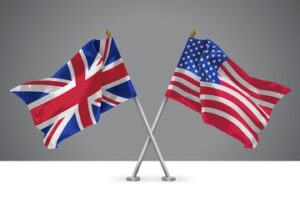
According to the results of a survey conducted by Active Group in collaboration with Experts Club in August 2025, Ukrainians identified priority areas for the development of foreign economic relations.
The majority of respondents – 81.3% – believe that Ukraine should first and foremost develop economic cooperation with the countries of the European Union. The United Kingdom also received a high level of support – 66.5%, while the United States came in third with 62.7%.
Citizens also pay significant attention to Asian countries: 36.2% of respondents support expanding relations with Southeast Asian countries (Japan, South Korea, etc.), and 31.7% with China. At the same time, 29.5% pointed to the importance of deepening cooperation with countries in the Arab and Muslim world.
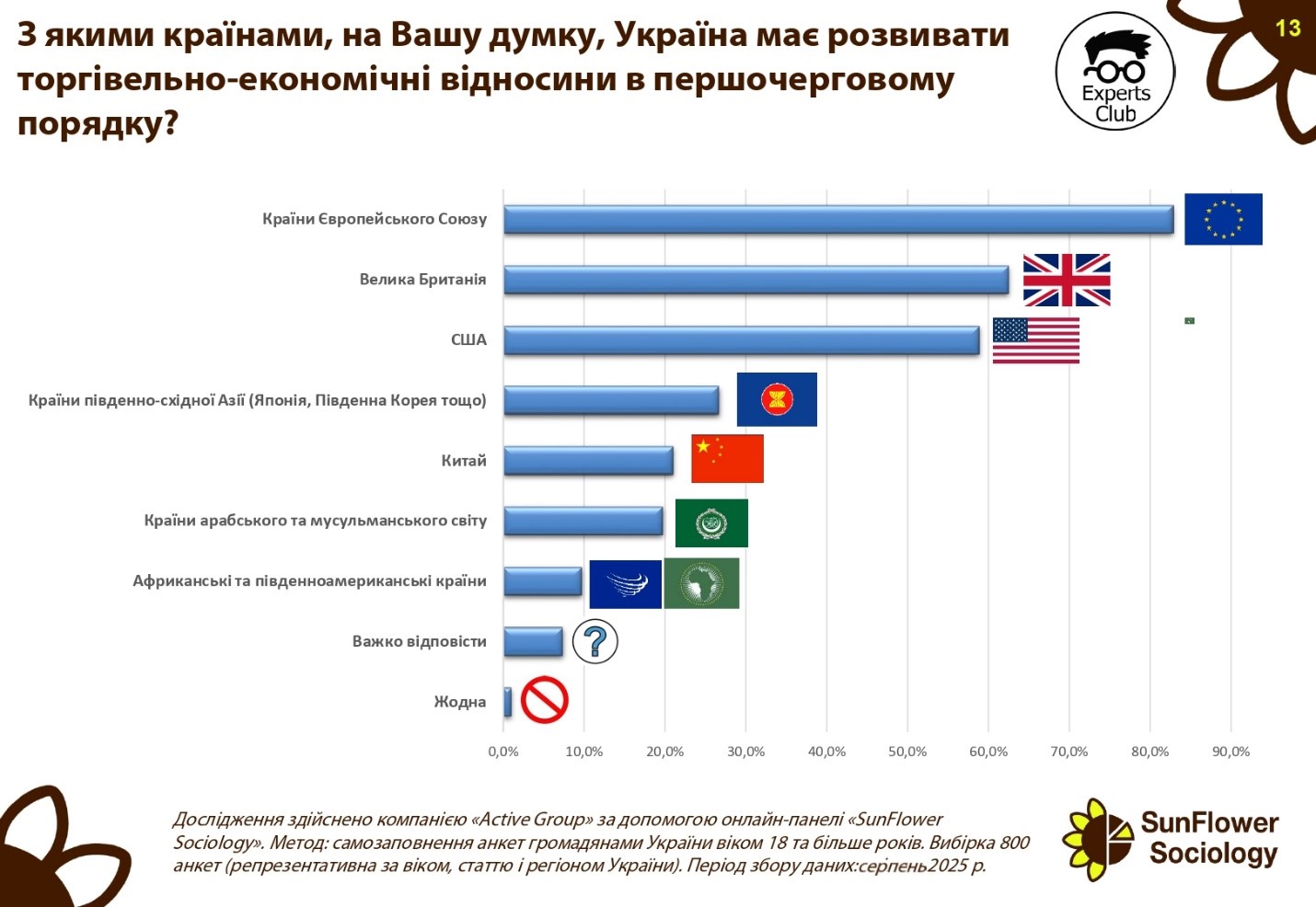
To a lesser extent, respondents are focused on partnerships with African and South American countries — this direction was supported by 14.8% of Ukrainians. Another 8.3% of respondents were undecided, and 1.0% believe that Ukraine does not need any new economic partnerships.
“These data clearly demonstrate the European and transatlantic orientation of Ukrainians in terms of economic priorities. The EU, the UK, and the US form the basis of foreign economic trust, while Asia and the Arab world are perceived as promising but secondary partners,” commented Active Group Director Oleksandr Pozniy.
According to Experts Club co-founder Maksim Urakin, the survey results confirm the real economic structure of Ukraine’s trade.
“The EU is already Ukraine’s main trading partner, accounting for over 40% of trade turnover, but if we analyze individual countries, China remains the leader. The high levels of support for cooperation with the UK and the US reflect society’s trust in Ukraine’s political and economic partners during this difficult period. At the same time, interest in Asia and the Arab world indicates the need to diversify markets and seek new opportunities in the future,” he stressed.
The survey was conducted using self-completed questionnaires among 800 Ukrainian citizens aged 18 and older. The sample is representative in terms of age, gender, and region.
ACTIVE GROUP, Arab countries, CHINA, EU, EXPERTS CLUB, GREAT BRITAIN, JAPAN, Pozniy, SOCIOLOGY, SOUTH KOREA, TRADE, UKRAINIAN ECONOMY, URAKIN, USA

Ukrainians are generally neutral towards Tunisia, according to the results of a study conducted by Active Group in collaboration with Experts Club.
According to the survey, 16% of respondents have a positive opinion of the country (12.3% – mostly positive, 3.7% – completely positive). Four percent of respondents expressed a negative opinion (2.3% – mostly negative, 1.7% – completely negative). At the same time, the majority of Ukrainians chose a neutral position – 72.3%, while another 7.7% said they knew little about this country.
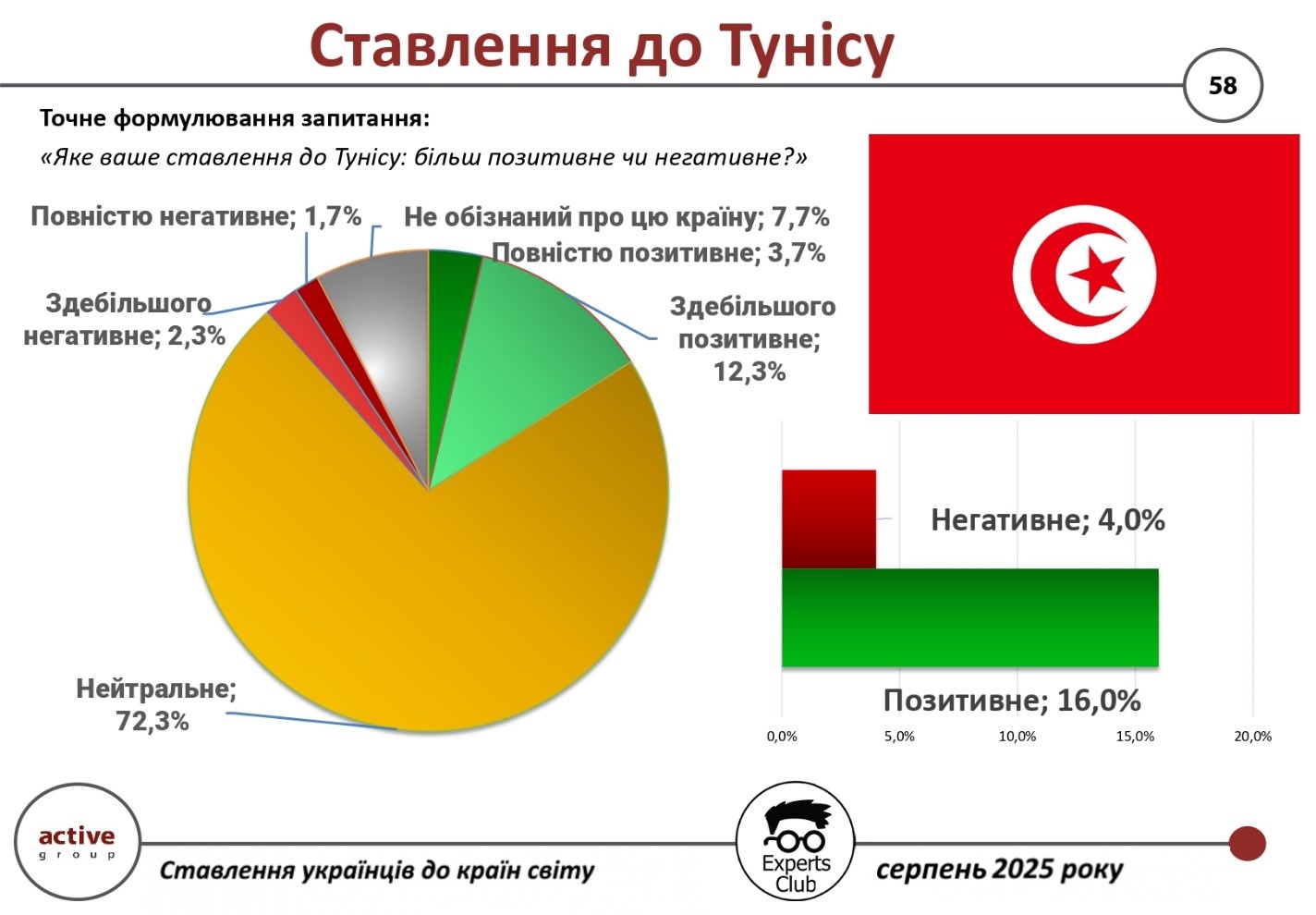
At the end of 2024, trade turnover between Ukraine and Tunisia amounted to $153.9 million, of which Ukrainian exports amounted to $133.4 million and imports to $20.5 million. The positive balance was $112.9 million.
“Ukraine has fairly stable economic relations with Tunisia. The significant positive trade balance shows that Ukrainian goods, in particular agricultural products and metals, are in demand in the North African market. At the same time, due to geographical distance and weak information links, Ukrainians’ attitude towards Tunisia is mostly neutral,” said Experts Club founder Maksim Urakin.
The full video can be viewed at: https://www.youtube.com/watch?v=YgC9TPnMoMI&t
You can subscribe to the Experts Club YouTube channel here: https://www.youtube.com/@ExpertsClub
ACTIVE GROUP, EXPERTS CLUB, Pozniy, SOCIOLOGY, TRADE, TUNISIA, UKRAINE, URAKIN

According to the results of a study conducted by Active Group and Experts Club in August 2025, Ukrainians rated the role of European Union countries in promoting peace in Ukraine the highest.
According to the survey, 42.0% of respondents believe that the EU (primarily France and Germany) is making the greatest contribution to the peace process. 25.8% of respondents noted the key role of the United States, and 12.8% noted the key role of the United Kingdom. At the same time, 11.7% of Ukrainians believe that no country is contributing to the establishment of peace, while 5.8% were unable to decide on an answer. Significantly fewer respondents noted other countries: China — 1.3%, India — 0.5%, Brazil — 0.2%.
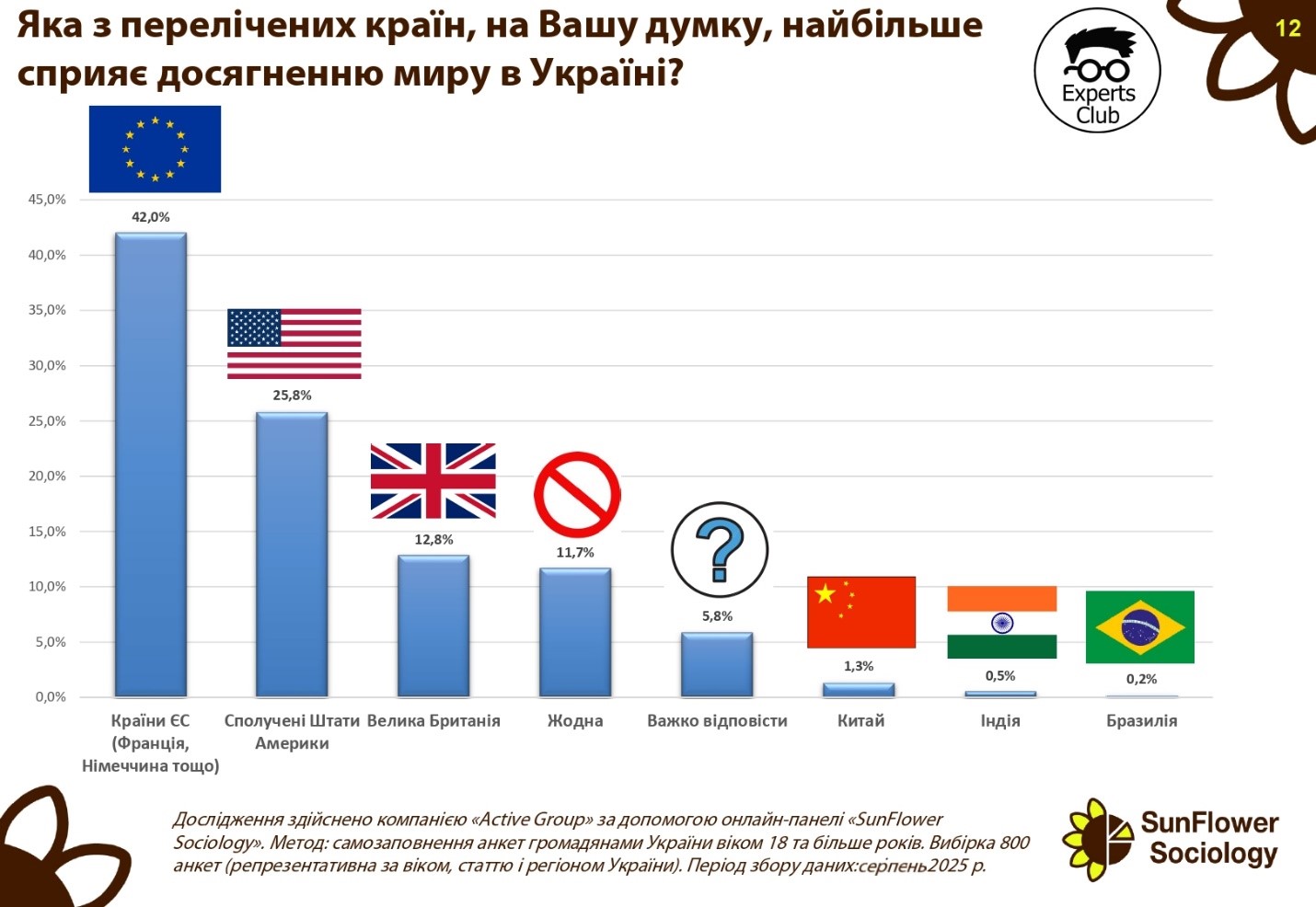
“The results show that Ukrainians rate the diplomatic and political efforts of the EU and the US highest. Together with the UK, these countries form the main international triangle of trust for Ukrainian society,” said Active Group Director Oleksandr Pozniy.
Maksim Urakin, co-founder of Experts Club, emphasized the economic dimension of the partnership.
“For our country, it is important not only to have a political partnership with the EU, the US, and the UK, but also an economic one. China, on the other hand, despite its leadership in trade with Ukraine, remains on the periphery of the peace process,” he said.
The survey was part of a large-scale project by Active Group and Experts Club to study Ukraine’s international image and foreign policy orientations.
ACTIVE GROUP, CHINA, EU, EXPERTS CLUB, peace in Ukraine, Pozniy, SOCIOLOGY, UK, URAKIN, US
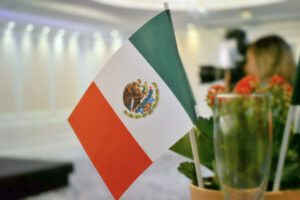
The vast majority of Ukrainians have a neutral attitude toward Mexico, although positive assessments significantly outweigh negative ones. This is evidenced by the results of a study conducted by Active Group in collaboration with Experts Club.
According to the survey, 19.7% of respondents have a positive opinion of Mexico (15.3% — mostly positive, 4.3% — completely positive). A negative attitude is held by 10% of respondents (9% — mostly negative, 1% — completely negative). At the same time, the majority of Ukrainians — 67% — take a neutral position, while another 3.3% admitted that they are not familiar with the country.
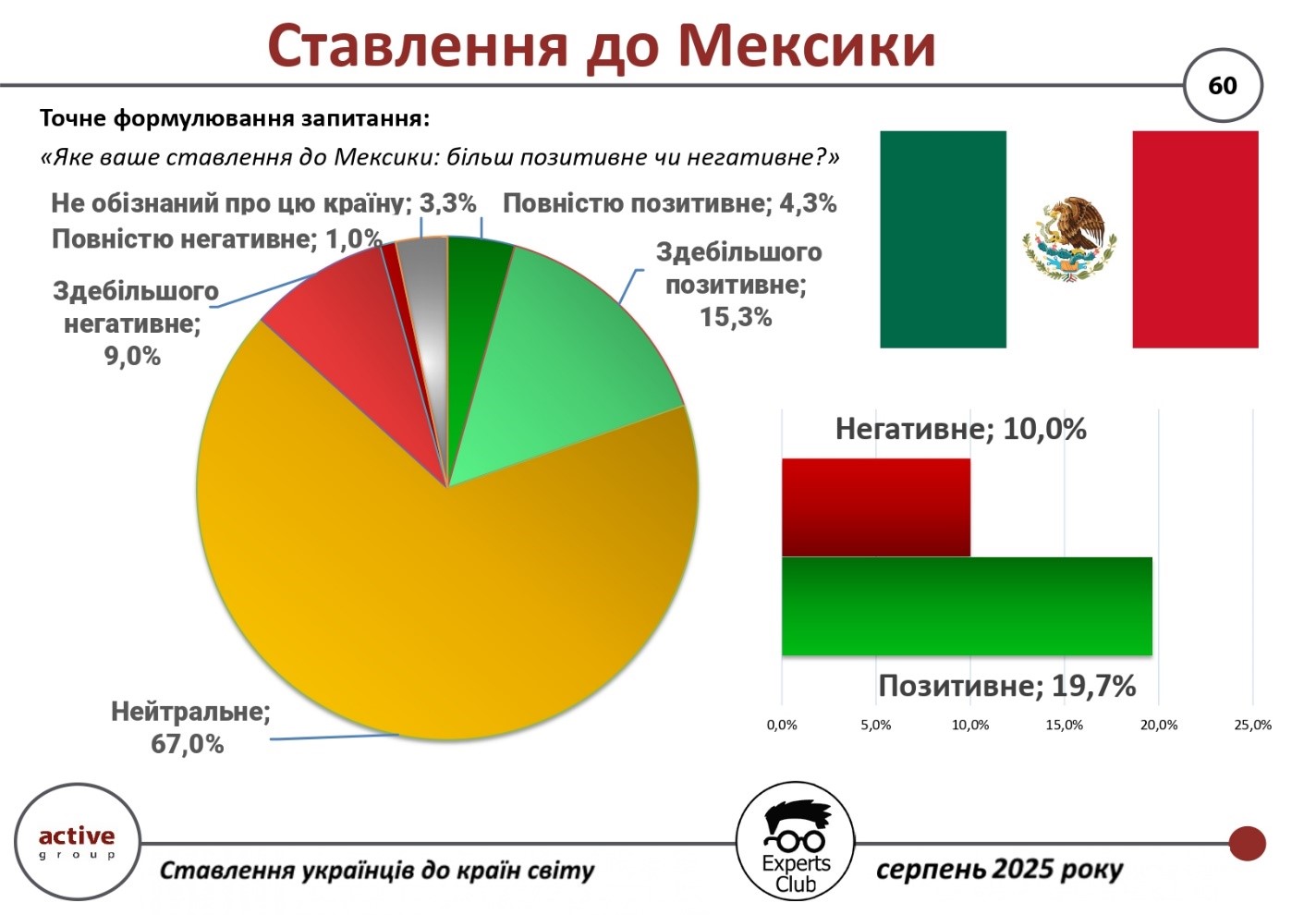
At the end of the first half of 2025, trade turnover between Ukraine and Mexico amounted to $169.1 million, of which exports from Ukraine amounted to $28.9 million and imports from Mexico amounted to $140.1 million. The negative balance amounted to $111.2 million.
“The high level of neutrality towards Mexico is explained by the country’s remoteness and limited direct contacts. At the same time, trade between Ukraine and Mexico is showing some momentum, although the structure of relations is currently unbalanced — Ukrainian exports are significantly lower than imports,” said Experts Club founder Maksim Urakin.
The full video can be viewed at: https://www.youtube.com/watch?v=YgC9TPnMoMI&t
You can subscribe to the Experts Club YouTube channel here: https://www.youtube.com/@ExpertsClub
ACTIVE GROUP, EXPERTS CLUB, MEXICO, Pozniy, SOCIOLOGY, TRADE, UKRAINE, URAKIN

A survey conducted by Active Group and Experts Club in August 2025 showed that Ukrainians’ attitude towards Algeria remains neutral overall.
According to the results, 75% of respondents said they were neutral towards the country. Positive assessments accounted for only 11.7% (of which 9.3% were mostly positive and 2.3% were completely positive). At the same time, 6% had a negative attitude, and another 7.3% of respondents said they were not familiar with Algeria at all.
“For Ukrainians, Algeria remains a relatively distant country, which explains the high level of neutral assessments. At the same time, positive attitudes still prevail over negative ones, and this creates a basis for further cooperation,” commented Alexander Pozniy, head of Active Group.
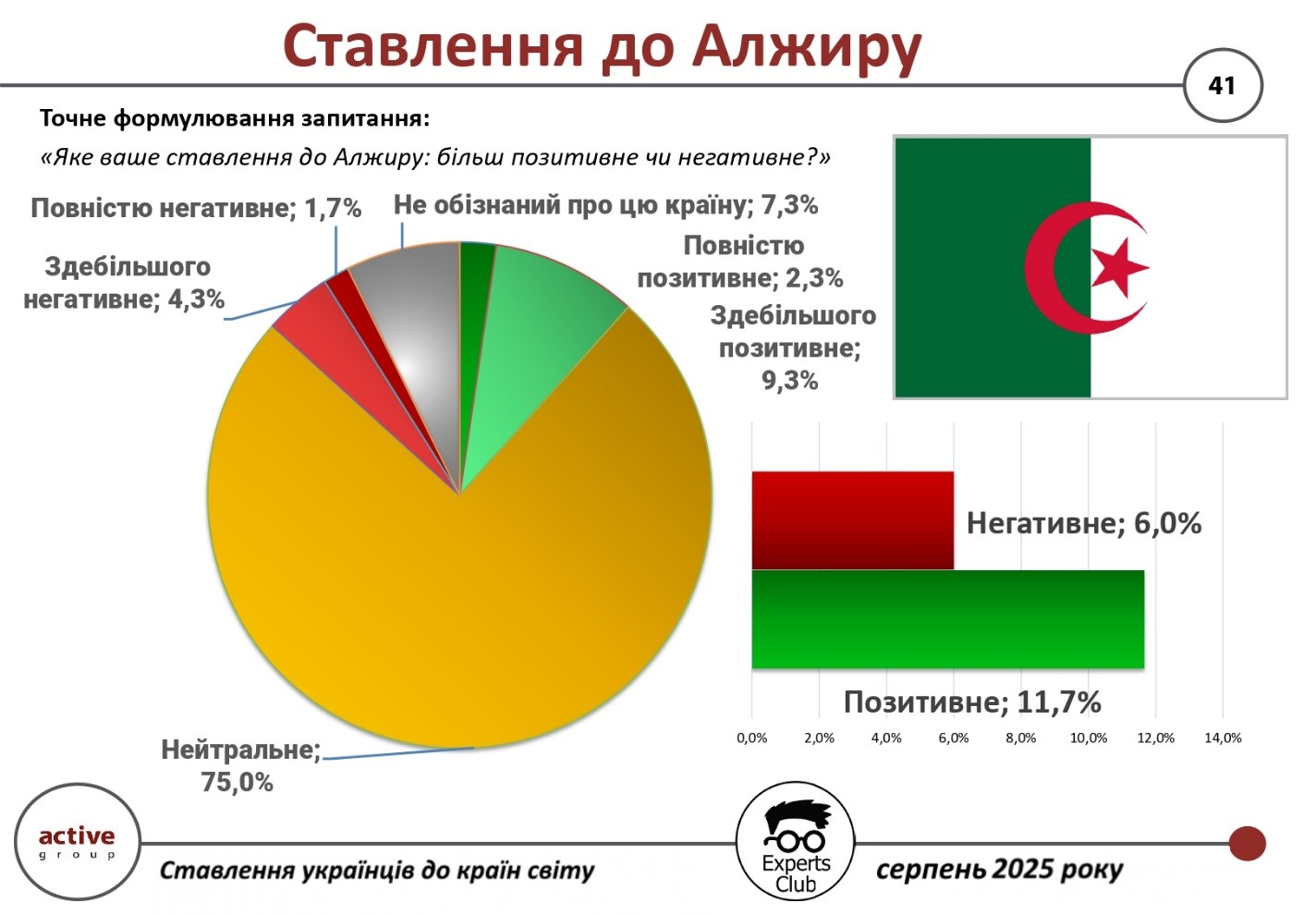
In turn, Experts Club co-founder Maksim Urakin emphasized the importance of economic ties:
“Despite relatively weak emotional perceptions, Ukraine and Algeria have a noticeable level of trade interaction. In 2025, bilateral trade exceeded $401 million. At the same time, Ukrainian exports amounted to $338.9 million, while imports of Algerian goods amounted to only $62.4 million. As a result, the trade balance is significant and positive for Ukraine — over $276 million. This indicates that economic cooperation can become the basis for further development of relations,” he stressed.
Thus, although Ukrainians’ attitude toward Algeria is mostly neutral, the economic balance looks very favorable for Ukraine.
The full video can be viewed at: https://www.youtube.com/watch?v=YgC9TPnMoMI&t
You can subscribe to the Experts Club YouTube channel here: https://www.youtube.com/@ExpertsClub
ACTIVE GROUP, ALGERIA, EXPERTS CLUB, Pozniy, SOCIOLOGY, TRADE, UKRAINE, URAKIN